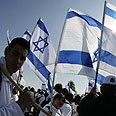
Marching for life amidst Polish mourning
Over 10,000 participate in annual March of Living from Auschwitz to Birkenau. 'This is our victory,' says grandson of Holocaust survivor taking part for first time
While the Polish people continued to mourn their president, who died along with his wife and the country's top political echelon in a plane crash on Saturday, more than 10,000 took part Tuesday in the March of the Living from the Auschwitz concentration camp.
"This is a difficult day for all Poles. We are marching and they are being very understanding of our need to commemorate the Holocaust," the march's director, Shmuel Rosenman, told Ynet.
As a token of sympathy with their Polish hosts, black ribbons were attached to the Israeli flags waived throughout the procession.
Participants hailed from 45 countries, and were not all Jewish. "We are going to proudly say – we are here, even 60 years after the war we remind the entire world to never forget," Rosenman added.
Eitan Petigro, 29, is participating in the March for the Living for the first time. For him, it will be like closing a circle, "On Saturday, before the trip, I went to Yad Vashem to do some research, and also shared it with some people here in Poland.
"My grandfather went through a path laden with obstacles – he enlisted to the Polish army in 1939, following the German invasion, was injured and went through rehabilitation for a few months," he said.
'Sense of pride'
"In 1941 he joined Stalin's Penal Battalions in the Red Army, where he was injured again and went through rehabilitation for seven months. During this time he found out that his entire family, along with the entire Jewish community in the village he came from were murdered in the slaughter pits," he added.Reading names of victims in Paris (Photo: AFP)
"In the hospital he met my grandmother, his second wife, and they immigrated to Israel, where they lost their first born at the Yom Kippur War. It is a man that has been through a lot in life," Petigro concluded.
Taking part in the March for the Living gives a sense of pride especially to Petigro. "This is the path grandfather showed us – he bequeathed Zionism and the State to us. This march, along with many Israelis and Jews is without a doubt a show of presence that we continue to hold.
"I am sure it gives the survivors a sense of pride to see their grandchildren and great grandchildren promising the future of our existence. It is our victory," he added.
Standing during two-minute siren, near Jerusalem (Photo: Gil Yohanan)
Vice Prime Minister Moshe Yaalon participated in the March of the Living in Ponar, Lithuania, where he called upon leaders of the free world "one way or another to stop the Iranian regime, which continues to direct its efforts toward developing military nuclear capabilities."
"We must learn the important lesson of the Holocaust – fanatic ideology cannot be stopped through appeasement," said Yaalon.
Earlier, two-minute siren wailed across the State of Israel. Memorial ceremonies were held at Yad Vashem in Jerusalem and the Knesset held its annual Holocaust remembrance ceremony, dubbed "'Unto every person a name," during which the names of Holocaust victims were read aloud.
President Shimon Peres
said his family members were put inside a synagogue and burned alive.Former Chief Justice Aharon Barak spoke about his lessons from the Holocaust during a memorial ceremony at Herzliya's Interdisciplinary Center. "My lesson is twofold: First of all – The State of Israel – how important this country is for us. No only in terms of looking at the Shoah, but more significantly by looking ahead – so that such an event will never repeat itself," he said.
"My second lesson is the human being. The Germans not only tried to take our lives, they tried to take out human dignity. They treated us like dust and ashes. At the end of the day they were not successful, not only in terms of those who stayed alive, but also because these in the ghettos had a cultural life. There was music in the ghetto and the Germans would come to listen to the orchestra," said Barak who survived Kovno Ghetto.
Roni Sofer contributed to this report












